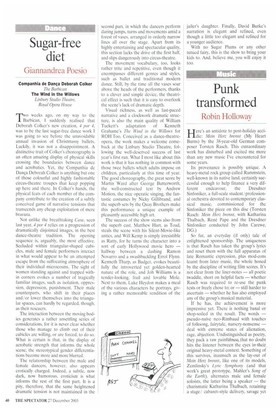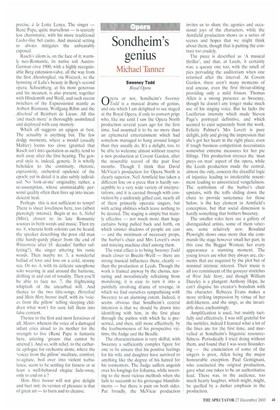Punk transformed
Robin Holloway
Here's an antidote to post-holiday accidie: Mein Herz brennt (My Heart Burns) by the 38-year-old German composer Torsten Rasch. This extraordinary work has disturbed and excited me more than any new music I've encountered for some years.
Its provenance is possibly unique. A heavy-metal rock group called Rammstein, well-known in its native land, certainly successful enough to help finance a very different endeavour, the Dresdner Sinfoniker, a full-scale student/professional orchestra devoted to contemporary classical music, commissioned for the Sinfoniker the piece on this disc (Torsten Rasch: Mein Herz brennt, with Katharina Thalbach, Rene Pape and the Dresdner Sinfoniker conducted by John Carewe, DG.) So far, an everyday (if only) tale of enlightened sponsorship. The uniqueness is that Rasch has taken the group's lyrics and reset them with the full apparatus of late Romantic expression, plus mod-cons learnt from later music, the whole honed by the discipline of writing film scores. It's not clear from the liner-notes — all poetic twaddle, short on helpful facts — whether Rasch was required to re-use the punk texts or freely chose to; or — still harder to ascertain — whether he has also employed any of the group's musical material.
If he has, the achievement is more impressive yet. There is nothing banal or shop-soiled in the result. The words — pseudo-naïve neo-Rimbaud with touches of folksong, fairytale, nursery-nonsense — deal with extreme states of alienation, rage, abjection. Undistinguished as poetry, they pack a raw painfuingss_that no doubt hits the listener between the eyes in–their original heavy-metal context. Something of this survives, inasmuch as the lay-out of Mein Herz brennt, like one of its models, Zemlinsky's Lyric Symphony (and that work's great prototype. Mahler's Song of the Earth), alternates male and female soloists, the latter being a speaker — the charismatic Katharina Thalbach, retaining a stage / cabaret–style delivery, savage yet precise, a la Lotte Lenya. The singer — Rene Pape, quite marvellous — is scarcely less charismatic, with his more traditional Lieder-like bel canto. And musical setting as always mitigates the unbearably exposed.
Rasch's idiom is, on the face of it, warmly neo-Romantic, its native soil AustroGerman circa 1900, with a highly recognisable Berg extension-valve, all the way from the first Altenberglied, via Wozzeck, to the hymning of Lulu's beauty in Berg's second opera. Schoenberg, at his most generous and his meanest, is also present, together with Hindemith and Weill, and such recent twitchers of the Expressionist mantle as Aribert Riemann, Wolfgang Rihm and the Abscheid of Reinbert de Lieuw. All this 'and much more' is thoroughly assimilated and deployed with easy mastery.
Which all suggests an epigon at best. The actuality is anything but. The few dodgy moments, where a model (usually Mahler) looms too close (granted that Rasch isn't into quotation as such), tend to melt away after the first hearing. The general style is, indeed, generic. It is wholly beholden to the continuity, rhetoric, expressivity, orchestral opulence of the epoch; yet in detail it is also subtly individual. No `look-at-me' originality; rather, a re-assumption, whose unmistakable personal quality often then fires up into incandescent heat.
Perhaps this is not sufficient to tempt! There is sheer loveliness here, too (albeit piercingly intense). Begin at no. 6, Nebel (Mist), closest to its late Romantic sources in both words and music. Then try no. 8, wherein both soloists can be heard; the speaker describing the poor old man (the hurdy-gurdy player from the end of Winterreise after 18 decades' further suffering?), the singer uttering his runic words. Then maybe no. 3, a wonderful ballad of love and loss on a cold, stormy sea. Or no. 4, with its delicate saxophone solo weaving in and around the baritone, drifting in and out of tonality. Then you'll be able to face no. 7, the frightening whiplash of the uncurbed will. And thence to the two title-songs. Herzeleid and Mein Herz brennt itself, with its 'voices from the pillow' telling sleeping children what won't for sure lull them into false content.
Thence to the first and most ferocious of all. Mutter, wherein the voice of a damaged infant cries aloud to its mother for the strength to live (Rene Pape is fantastic here, uttering 'groans that cannot be uttered'). And so, with relief, to the cathartic epilogue for orchestra alone, where the 'voices from the pillow' meditate, comfort, re-agitate, boil over into violent turbulence, seem to be settling for fatness or at least a well-behaved elegiac fade-away, only to end on a?
Mein Herz brennt will not give delight and hurt not: its version of pleasure is that of great art — to burn and to cleanse.



























































 Previous page
Previous page